Rainforest vine compound starves pancreatic cancer cells

Pancreatic cancer cells are known for their ability to thrive under extreme conditions of low nutrients and oxygen, a trait known in the cancer field as "austerity." The cells' remarkable resistance to starvation is one reason why pancreatic cancer is so deadly. Now researchers have identified a compound from a Congolese plant that has strong "antiausterity" potential, making pancreatic cancer cells susceptible to nutrient starvation. They report their results in ACS' Journal of Natural Products.
Pancreatic cancer is one of the deadliest forms of cancer, with a 5-year survival rate of less than 5 percent. Because these cancer cells proliferate so aggressively, they deplete nutrients and oxygen in the region of the tumor. Whereas most cells would die under these extreme conditions, pancreatic cancer cells survive by activating a cell signaling pathway called Akt/mTOR. Some researchers are testing plants for antiausterity compounds that disrupt this pathway. Suresh Awale, Gerhard Bringmann and colleagues previously identified some unusual alkaloid compounds with antiausterity potential from vines found in the Congolese rainforest. Now they wanted to look for additional new compounds from twigs of the vine Ancistrocladus likoko.
The team extracted compounds from ground twigs and separated them by high-performance liquid chromatography. They then characterized the 3-D structure of a new alkaloid compound, which they named ancistrolikokine E3. The researchers found that this new compound killed pancreatic cancer cells under conditions of nutrient starvation but not when nutrients were plentiful. Ancistrolikokine E3 also inhibited cancer cell migration and colonization in lab tests, which suggests that the compound could help prevent metastasis in patients. The researchers showed that the compound worked by inhibiting the Akt/mTOR pathway. The new alkaloid is a promising compound for anticancer drug development based on the antiausterity strategy, the researchers say.
More information: Suresh Awale et al. Ancistrolikokine E3, a 5,8′-Coupled Naphthylisoquinoline Alkaloid, Eliminates the Tolerance of Cancer Cells to Nutrition Starvation by Inhibition of the Akt/mTOR/Autophagy Signaling Pathway, Journal of Natural Products (2018). DOI: 10.1021/acs.jnatprod.8b00733
Journal information: Journal of Natural Products
Provided by American Chemical Society



















